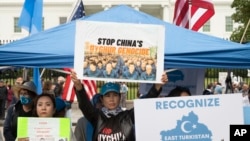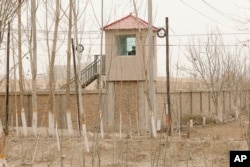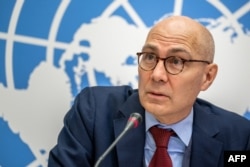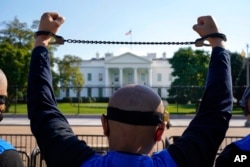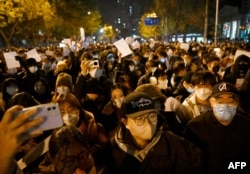Only a few months into his job as the newly appointed United Nations High Commissioner for Human Rights (OHCHR), Volker Tuerk said he is "determined" to personally continue engaging with Beijing on the findings of his predecessor about human rights concerns in China's Xinjiang region.
"The report that was issued on the 31st of August is a very important one," Tuerk told reporters at a press conference in Geneva in early December. "It has highlighted very serious human rights concerns and my focus is on following up on the recommendations that are contained in the report."
Former OHCHR head Michelle Bachelet released a human rights assessment of Xinjiang on her final day in office. The 48-page report concluded that China "may have committed crimes against humanity" against Uyghurs and other predominantly Muslim ethnic groups in Xinjiang, including religious, cultural, and linguistic identity and expression; rights to privacy and freedom of movement; reproductive rights; forced labor; family separation; and retaliation for dissent.
China's response
China has repeatedly denied allegations of crimes against humanity, forced labor and other human rights abuses in Xinjiang, including arbitrarily placing people in detention and re-education camps.
"The OHCHR's so-called assessment on Xinjiang is orchestrated and produced by the U.S. and some Western forces and is completely illegal, null and void," Liu Pengyu, spokesperson for the Chinese embassy in Washington, told VOA in an email. "It is a patchwork of disinformation that serves as a political tool for the U.S. and some Western forces to strategically use Xinjiang to contain China."
According to Liu, China's "strenuous efforts" to counter violent terrorism, radicalization and separatism have ensured there have been no violent terrorist incidents in Xinjiang for six consecutive years.
State news agency Xinhua quoted Shohrat Zakir, then-chairman of the regional government, who refuted accusations of genocide. He said the claims "blatantly trampled on international law and basic norms, grossly interfered in China's internal affairs and seriously hurt the feelings of all ethnic groups in Xinjiang."
Steps toward accountability
Many Western nations and human rights organizations, however, have taken action following the report.
Sophie Richardson, China director of Human Rights Watch, said Tuerk's public endorsement of his predecessor's report is a positive step forward for human rights accountability in Xinjiang.
"It has been, I think, encouraging even just in the last week to see the new U.N. High Commissioner for Human Rights Volker Tuerk say publicly that he endorses the report's findings," Richardson told VOA.
She added, the report "draws largely on interviews and on Chinese government documents and paints a damning picture of systematic violations, torture, family separations, sexual violence, and misuse of counterterrorism legislation across the region and makes recommendations."
In October, the U.S. and seven Western nations presented a draft resolution to request a discussion in the U.N. Human Rights Council about the Xinjiang report. The draft resolution failed by a slim margin of two votes.
"And then separately, we have seen other efforts, for example, the Uyghur Forced Labor Prevention Act coming into effect in the United States," Richardson said. "Much more detailed discussions began about forced labor and the regulatory frameworks in places like the European Union."
Even before the release of the U.N. report, the U.S. began enforcing the Uyghur Forced Labor Prevention Act (UFLPA) in June, requiring companies to prove that their products coming from China are free from forced Uyghur labor. Then in September, the European Commission, the legislative arm of the European Union, released a proposal on banning products made by forced labor from entering and exiting the EU market.
Richardson suggested some "overriding priorities" that democratic governments around the world should focus on in 2023 when it comes to demanding accountability for China's actions in Xinjiang such as an international independent investigation into crimes against humanity in Xinjiang and an end to forced labor goods entering supply chains or product streams anywhere in the world, not just in the United States.
Many countries silent
While some 50 countries in 2022 have made gestures toward demanding accountability for China's treatment of Uyghurs and other Muslim minorities in Xinjiang, "nothing has changed" in these communities, said Dolkun Isa, president of Munich-based World Uyghur Congress. He also noted that many countries remain silent about the plight of the Uyghurs.
"Some countries are already condemning it, but unfortunately, majority member states of the United Nations [are] still in silence," Isa told VOA. "Around 150 countries are still silent and even some countries support China. Particularly, mostly Muslim majority countries."
Terrorism, extremism and repression
China began increasing its repression against the Uyghurs and other Muslim groups in Xinjiang eight years ago, launching the "People's War on Terror" after several violent incidents occurred allegedly committed by Uyghur Muslims. Then in 2016, the Chinese government campaign began targeting all Muslim groups in Xinjiang under so-called anti-terrorism, extremism laws, Isa said.
"[The] Chinese government started (a) war against Islam. All values of the religion of Islam are targeted by the Chinese government," Isa told VOA.
"Serious human rights violations have been committed in XUAR in the context of the [Chinese] Government's application of counterterrorism and counter-'extremism' strategies," the U.N. report said. "The implementation of these strategies, and associated policies in XUAR has led to interlocking patterns of severe and undue restrictions on a wide range of human rights. These patterns of restrictions are characterized by a discriminatory component, as the underlying acts often directly or indirectly affect Uyghur and other predominantly Muslim communities," stated the report.
Chinese solidarity with Uyghurs
The response of many U.N. member states to the Uyghur issue is based on political calculations in how they align with China, said Ilshat Hassan Kokbore, an American Uyghur political analyst and vice chairman of the executive committee of the World Uyghur Congress.
An important turning point however, many rights activists said, is the deadly November 24 apartment fire in in the city of Urumqi, the capital of Xinjiang, where Uyghurs died, causing an outcry from the ethnic majority Han Chinese people.
"The Chinese calls for justice for Uyghur genocide victims are encouraging. We hope they continue to do so and learn more about the reality of Uyghur genocide beyond just an apartment building fire," Kokbore told VOA.
Following the fire, citizens across China took to the streets in protest against the country's strict zero-COVID policy. Some overseas Chinese, including those in the U.S., organized vigils for the fire victims.
Since the protests, China has relaxed its signature COVID-19 policy.
The U.S. designated the human rights abuses in Xinjiang as genocide. Parliaments of Canada, the Netherlands, Britain, Lithuania and France described China's actions against Uyghurs as genocide. Parliaments of Belgium and the Czech Republic condemned China's treatment of Uyghurs as crimes against humanity. New Zealand's parliament declared its concern over "severe human rights abuses" in the Xinjiang region.




